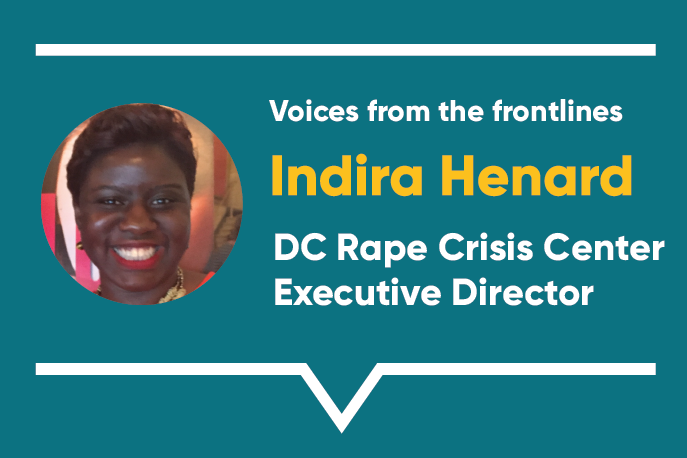As all of us navigate these unprecedented times, RALIANCE is highlighting how the COVID-19 pandemic is impacting the work of advocates and ushering in new needs for rape crisis centers and survivors around the world. We spoke with Indira Henard, Executive Director at the DC Rape Crisis Center (DCRCC), about how her organization is helping survivors in the nation’s capital.
How have you seen the coronavirus pandemic impact survivors and rape crisis centers?
Rape crisis centers are on the frontlines of the COVID-19 crisis, and they should be considered first responders. What we are hearing and seeing in terms of the impact on survivors of sexual violence is that the stay-at-home orders are having a significant emotional impact on survivors. We must remember that sexual violence is not about sex. It’s about power and control, and so survivors’ entire sense of control has been taken from them.
Rape crisis centers are on the frontlines of the COVID-19 crisis, and they should be considered first responders.
Can you tell us more about how DCRCC is supporting survivors in light of social distancing?
We have created multiple pathways for survivors’ healing journeys. We’re seeing close to 100 individual and group clients via telehealth per week. Our advocates are working nonstop. We’ve seen a significant increase on our 24/7 hotline, and as a result we are adding two additional lines to our hotline infrastructure in order to meet the increased demand. We also offer training and hands-on support to help partner organizations in how to respond and manage during the COVID-19 crisis.
With the increased demand for services during the pandemic, what do you anticipate is the long-term impact of COVID-19?
We, just like other rape crisis centers across the country, expect a significant surge in services once we start hitting the recovery phrase. We are going to need resources and all hands on deck in order to meet that demand and reach for the most vulnerable residents here in the district.
We, just like other rape crisis centers across the country, expect a significant surge in services once we start hitting the recovery phrase. We are going to need resources and all hands on deck.
Can you tell us more about how you’ve seen COVID-19 impact survivors of color who live in the nation’s capital?
It’s important to uplift that the majority of COVID-19 patients and deaths have been people of color. This is hitting hard within the African American community, and those residents are some of our most vulnerable and often need services such as sexual assault services or domestic violence services. When survivors of color are living in certain parts of the city – for example, the majority of our clients come from DC Wards 5, 7, and 8 – you see that services, like the metro, being reduced across the city has a greater impact on predominantly African American areas of the city. What’s important to know for folks of color is if you have existing health problems or conditions, like so many of the survivors of trauma and PTSD we serve do, that can impact and enhance the possibility of getting COVID-19.
What types of policy solutions do you think are needed to help rape crisis centers in the midst of this pandemic?
On just a basic policy level, rape crisis centers need to be funded. The biggest mistake right now is not realizing that the definition of “first responder” is broader than what we took it traditionally to be. We at DCRCC are first responders for mental health. We are on the ground and we are working nonstop, so on a policy level that needs to be reflected.
As the leader of an organization serving survivors and communities, what do you want survivors to know right now?
Reach out to us for support, whether it’s through our 24/7 hotline or requesting individual or group therapy. We want survivors to take care of themselves as much as possible. We at the DC Rape Crisis Center know that there is no straight path to healing. We are standing with them and we are advocating for them, and, more importantly, we are with them on their healing journey.
What do you recommend individuals do to help rape crisis centers like yours?
1. Invest in your local rape crisis center. We need financial resources in order to continue to meet this increased demand.
2. If you’re interested in volunteering, we hold volunteer training three times a year so feel free to reach out.
3. Stand up for survivors. Continue to center the needs of survivors of sexual violence, particularly from an intersectional lens.
4. Understand that the staff at every crisis center across the country are operating on a heavy load right now. We welcome any wellness or self-care donations to our staff as well.
Who and what inspires you?
Survivors of sexual violence inspire me. I have been doing sexual violence work for 20 years and I have been at the DC Rape Crisis Center for 12 years, and so for me there is no higher honor than being in service to survivors of sexual violence. We will continue to be on the front lines and trenches, advocating for survivors. I know deep down that during those hard days that there is hope and healing.
Stay tuned for more interviews in this series!

